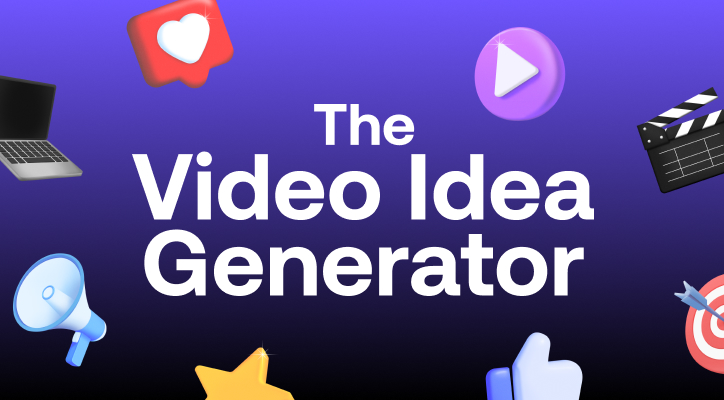Video is an engaging, versatile and shareable format that your brand can use to get your message across. According to Hubspot, 53% of people would like to see more video content from brands in the future.
That’s why video interviews — where your CEO, a member of your team, or an industry expert answers questions on camera — can be a great way to humanize your brand, make a meaningful connection with your viewers, and enhance your marketing, internal comms, or employer branding.
The problem? Traditional corporate interview videos can be… dull at best, and an absolute snooze-fest at worst. Plus, having your corporate interview made by a professional agency can be extremely time-consuming — not to mention expensive.
Why You Should Consider Making In-house Video Interviews
To make an interview video in-house, you simply need to think of some questions to ask your subject and edit their responses into a digestible format. And just like that you have a compelling piece of content to share on your social media, send out to your email subscribers, and even repurpose for podcasts and other content.
Plus, thanks to tools like PlayPlay, you can shoot and edit videos with no editing expertise.
And if you’re still not convinced, here are more reasons why you should be making interview videos for your brand!
1. Videos Interviews are authentic
Because they feature real people using their own words, interviews are probably the most authentic form of video content you can make.

PlayPlay pro tip:
To get great natural footage of your subjects being themselves, always start shooting before you start the interview and keep the camera rolling afterwards.
2. They’re quick and easy to make
All you really need to get started is a decent camera phone, a tripod for your phone, and a cheap lapel mic. Since this type of video relies on your interviewees’’ responses, you don’t need to invest much time in scripting or storyboarding either.
3. They’re engaging
Video is far more engaging than written content. By using a combination of music, visual elements, and — yes — the right questions, you can get your message across in a way that keeps viewers watching until the end.
4. They’re versatile and easy to repurpose
You can use video interviews to introduce your CEO or senior management and give your company a human face, to promote your employer brand, or even for your own internal communications.
Interview videos are also incredibly easy to repurpose for other content later on. For example, you could:
- Distil the key takeaways from the interview into a blog post
- Reuse parts (or all) of the audio from your video in a podcast
- Extract short clips to share on social media
It's even more interesting when you have a video background for your interview that viewers will remind.
6 Types of Questions to Include in Your Video Interviews (with examples)
The most crucial part of preparing for a video interview is deciding what questions to ask your subject. Asking the right questions can mean the difference between a boring, static video that will have your audience snoozing (or worse, scrolling straight past), and a dynamic, fun piece of content that humanizes your brand and shows off your fun side.
But don’t panic: read on for our ultimate list of questions to ask in your interview video.
1. Employer branding or recruitment questions
Interview videos are a great way to reinforce your employer brand, get the word out about open roles, and show prospective candidates what it would be like to work at your company.
You could record a simple interview with your CEO, hiring manager, or someone else at your company. Alternatively, you could interview several employees and edit their answers together, like in this example from HubSpot:
By including interviews with multiple people, as well as behind-the-scenes moments and cut-away shots of the office space, this video does a great job of showcasing HubSpot’s personality as a brand.
This video also raises an important point: you don’t have to include your questions in the video. In fact, you can make a stronger and more engaging piece of content by simply editing together multiple team members’ responses and leaving the questions unsaid.
And viewers can still guess some of the questions HubSpot might have asked their employees in this video. For example:
- What’s the coolest thing about [the company]?
- What’s your favorite thing about working at [the company]?
- What makes [the company] different from other companies?
- What is the most rewarding part of working here?
Here are some other questions you could use for your employer branding or recruitment videos:
- How did you start working for [the company]?
- What positions are you currently hiring for?
- Why should someone join [the company]?
- What’s a benefit of working at [the company] that not many people know about?
- What kind of people would suit a job at [the company]?
- What does a typical day at [the company] look like?
- What’s your favorite part of your working day?
- What inspires you at work?
2. Expert interview questions
If you want to make an educational video, an interview with someone who’s an expert in the subject matter is a great way to go. You could interview someone in your company on a new trend or news story that’s relevant to their area of expertise, or reach out to industry thought-leaders to really make an impact.
In this video, WIRED takes the innovative approach (that they’ve become known for) of taking the questions directly from their audience on Twitter. This could be a great source of interview questions if you have a big following, as it further breaks down the wall between the interview subject and the viewer — as well as providing an easy way to make the video visually interesting by showing the tweets on the screen.
The exact interview questions you should ask your expert will vary on their area of expertise and the subject of the video, but you can use the following list for inspiration:
- What’s your favorite thing about [your area of expertise]?
- What do you wish people knew about [your area of expertise]?
- What’s the biggest misconception about [your area of expertise]?
- Can you explain [your area of expertise] in less than 10 words?
- Why does this issue matter?
- What are the biggest problems in [your field] right now?
- How could they be solved?
3. Offbeat interview questions
To avoid that dry, boring corporate interview feel, you might want to consider including some more unusual questions in your video. You could also choose to make a whole video — for example, an interview with your CEO or an employee spotlight — using a list of quirky questions. While this might not tell your viewers much about your products, it can be a great way to boost brand recognition while showing the fun side of your company.
Buzzfeed has really nailed the quickfire format with their 30 Questions in 3 Minutes series, including this one with Jessica Simpson. Here, they combine questions about Jessica’s life and career with quirky and offbeat questions that help show her personality.
Here are some examples of offbeat interview questions you could use for your videos:
- What made you laugh recently?
- Can you tell us about a book that changed you?
- What are your 3 wishes?
- What’s your newest hobby?
- Apart from your job, what are you an expert in?
- What’s your favorite story from a work meeting?
- Can you tell us a joke?
- What word do you use the most?
- What’s on your bucket list?
4. This or that questions
Another unusual and fun type of interview question is the “this or that” question. These make for great short-form videos that can easily be shared on social media. You could also incorporate some quickfire this-or-that questions into a more substantial interview — such as an employer branding or meet-the-founder video — to give it a fun edge and keep viewers engaged.
At just over two minutes, this interview with actress Emma Watson is a brilliant example of how this quickfire “this or that” format can make a fun and friendly video.
Here are a couple of examples of “this or that” questions you could ask your interviewee:
- Sweet or savory?
- Beach vacation or city break?
- Coffee or tea?
- Money or fame?
- Dog or cat?
- Book or movie?
- Email or phone call?
- Too hot or too cold?
5. Company or project questions
Want to spread the word about an upcoming or recently completed project? Or just tell potential clients what your company’s been up to? Consider shooting a video interview with your CEO or the leader of the project.
By choosing the right questions, you can put together an engaging video that tells your audience everything they need to know.
In this interview with the Co-Founder and Creative Director of production studio, Moment Factory, the interviewer keeps the questions open-ended to allow her subject to talk about his company and what’s important to them.
Here are some questions you could use for a video to tell your clients about your company or projects:
- What does [the company] do in three words?
- What are [the company’s] core values?
- Who does [the company] work with?
- What’s the next step for [the company]?
- Where do you see [the company] in five years?
- What were the biggest challenges in this project?
- What was the most exciting moment?
- What will this project mean for [the company]?
- Why did you decide to embark on this project?
6. Product testimonial questions
There’s no better way to showcase the benefits of your product or services than with an interview with the people who know it best — your customers. Video testimonials are a great way to build trust with potential clients, but you need to ask your happy customers the right questions to get the most complimentary responses out of them.
In this video made by Zoom, multiple employees from Zendesk take the viewer through the problems they had before using the product and the benefits it brought them.
Here are some questions you could use to get the best quotes out of your happy clients:
- Can you tell us about your company?
- What problems did you have before you found [the product/company]?
- Can you tell me how [the product/company] helped?
- Was [the product] easy to use?
- Would you recommend [the product/company] to colleagues?
- Why did you choose [the product/company] over our competitors?
- How has [the product/company] saved you time or money?
- What would you tell someone considering buying [the product/company]?

Interested in taking your interview video to the next level?
Build Brand Loyalty with Video Interviews
Whether you’re using your interview videos for marketing, internal comms, recruitment, or thought leadership, the key is to edit it into a fun, engaging format that will keep your audience engaged.
Thankfully, you can use PlayPlay’s simple video editor to make professional videos quickly and easily. It’s the perfect tool for adding dynamic transitions, text and music to your interview videos, with no previous technical skills. Give it a try with a 7-day free trial now.


